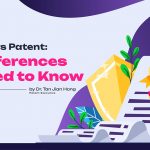1.1 Revisiting Copyright.
Referring to the former article from our blog (see TO REGISTER OR NOT TO REGISTER A COPYRIGHT http://nbs.com.my/blog/2016/06/to-register-or-not-to-register-a-copyright/), it is safe to infer that copyright is an important IP right that has to be conferred in a proper manner. Copyright is generally a form of protection that is provided by specific laws and regulations to the authors for their original work of authorship. This right is granted to prevent any unduly events where the original work of a particular author is taken advantage of by unauthorised third party. As mentioned in our previous article, the rule on copyright protection is governed by the Copyright Act 1987 which provides comprehensive protection for copyrightable works. Moreover, Malaysia is also a member of the Berne(Paris) Convention which allows Malaysian IP registration to be used as a basis for priority claim for countries which are party to these conventions. This copyright protection enabled the owners an exclusive right as follows:
- He/ She is allowed to reproduce the work owned;
- He/ She is permitted to distribute copies of the original work to the general public;
- He/ She is entitled to display or perform the copyrighted work publicly such as art exhibition and musical play;
- He/ She is entitled to digitally perform the work publicly by means of a digital audio transmission (in the case of sound recordings or broadcasts); and
- Most importantly the owner can authorize others to exercise the rights.
Emphasis should be focused on the last point above as it is the most important because it aids the owner to obtain financial gains through authorizing others to use the original work. As a reward, owners obtained royalties in return, and a chance in gaining further awareness towards the work. Hence, based on the discussion above, it can be seen that copyright protection is indeed a vital right that is granted to copyright owners. Nonetheless, it should be noted that there are exceptions to copyright protection. One of such exception is the doctrine of fair dealing (also known as fair use).
Fail Dealing; An exception to copyright protection.
It is should be noted that the copyright law aims to place an emphasis on balancing the interest of copyright owners for protecting their original work as well as accommodating the interest of the public for having reasonable access to copyright works of others. These exception and limitation of exclusive right of the copyright owner is provided in section 13(2) of Copyright Act 1987. Section 9(4) of the Act explains the permission of reproduction that is allowed by the act. The exceptions are reproduction of the typographical arrangement of a published edition for any purpose including research, private study, criticism, review or the reporting of news or current events does not infringe the copyright subsisting by virtue of this section if such reproduction is compatible with fair dealing. Hence, pursuant to the sections mentioned above, the copyright owner does not have the right to control or exercise his exclusive right in the even the act was done by ways of fair dealing purposes.
Nonetheless, it should be noted that fair dealing, although an exception to the copyright owner’s exclusive right, is an equitable right. Equitable right are rights that are conferred to someone provided the person acts in fair and just manner. Hence, if at any circumstance, the act was done in a non-equitable manner, the exception will not apply. An example of such cases is when the copyright is reproduced for the reasons specified in the section but has involve gain in profit. In such circumstances, the exception will not apply and the copyright owner would be able to exercise their exclusive right.
Conclusion.
All in all, although courts wish to provide an importance for user right, they do not fail to recognize that a proper balance should be maintained to not hinder the copyright owner’s protection accorded. The court have maintained a strict adherence to the protection rule. This can be seen in the case Rock Records (M) Sdn Bhd v Audio One Entertainment Sdn. Bhd ([2005] 1 CLJ 200) where Rock Record claimed that Audio One Entertainment has infringed its copyright in sound recordings by Malaysia artistes by converting them into karaoke video without obtain permission from Rock Record. Despite having a licence from copyright owner to reproduce the sound recording, the courts held that the licence did not extend to cover the reproduction of sound recordings in karaoke video CD format. Hence, the courts held that Audio One Entertainment have infringed the copyright and the plaintiff being Rock Record was granted a summary judgement. Therefore, it can be seen that courts have shown great importance in protecting the exclusive right of the copyright owner to prevent any unfair reproduction. To reinforce further the right accorded, it is advisable for copyright owners to record their works within the Voluntary Notification System by IP Registry (MYIPO). This will provide an extra layer of protection as well as reduce the hassle of copyright owners needing to prove their exclusive right for their original work.
If you need to know more about the trademark registration process or questions,
Please Contact Us: 03-58914846
Or Email Us: [email protected]
Website: www.nbs.com.my
©DHIVIYA OF NBS INTELLECTUAL SDN. BHD.
ALL RIGHTS RESERVED







Comments are closed.